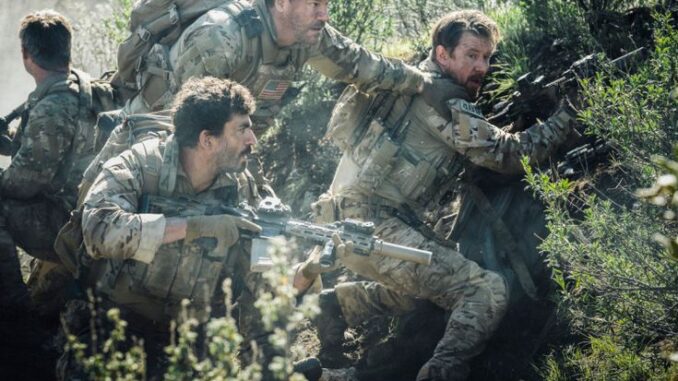
CBS’ ‘SEAL Team’ Review: David Boreanaz Battles Enemies and Demons
David Boreanaz’s portrayal of Jason Hayes, the seasoned leader of Team Bravo, has been the backbone of CBS’ SEAL Team. This military drama has consistently offered viewers gripping action, emotional depth, and a raw portrayal of the challenges faced by elite Navy SEALs. But as the series progresses, it’s clear that the stakes aren’t just about battling external enemies—Jason Hayes is also grappling with his inner demons. In this review, we’ll dive into the latest season of SEAL Team, exploring how Boreanaz’s performance takes the show to new emotional heights and what it means for both his character and the series as a whole.
The Return of Jason Hayes: Boreanaz’s Masterful Performance
David Boreanaz has always been known for his intensity on screen, whether as Angel in Buffy the Vampire Slayer or as the steadfast Jason Hayes in SEAL Team. In the latest season, he brings a level of vulnerability to Jason that we’ve never seen before. The external battles the SEAL team faces are harrowing enough, but it’s Jason’s internal struggles that add a new layer to the narrative.
A Leader in Crisis: Jason Hayes’ Struggles with PTSD

Jason Hayes has always been the rock-solid leader of Bravo Team, but this season, his character is grappling with the psychological toll of his years in combat. Boreanaz delivers a raw and honest portrayal of a man facing post-traumatic stress disorder (PTSD) and struggling with the weight of leadership. Jason’s demons come to the forefront as he’s forced to confront his mental health, an issue that has long been underrepresented in military dramas.
Boreanaz’s nuanced performance shows the real cost of war. Jason’s struggle to maintain control while battling the effects of PTSD makes his journey both compelling and heartbreaking. The show explores his emotional breakdowns, strained relationships with his teammates, and his growing awareness that he may not be able to keep leading his team.
External Battles: Team Bravo’s Latest Missions
While Jason’s personal battles take center stage, SEAL Team remains as action-packed as ever. The team’s missions are as intense as they are dangerous, and the stakes continue to rise. This season, Bravo faces a new set of enemies, including terrorist organizations and covert operations that test their loyalty and commitment.
The Team Dynamic: Bravo’s Strength in Unity
Throughout the series, one of the strongest aspects of SEAL Team has been the relationship between the team members. Despite the personal demons they each face, Bravo remains united in their mission. This season, however, the external pressure intensifies as Jason’s mental health begins to affect his leadership. The question arises: can Bravo remain united when their leader is struggling? The show digs deep into the dynamics of teamwork, trust, and the unspoken bond between soldiers who risk everything for each other.
David Boreanaz: More Than Just an Action Star
David Boreanaz is best known for his work in action-packed roles, but in SEAL Team, he’s proven that he’s so much more than just a tough guy. His portrayal of Jason Hayes is layered with emotion, vulnerability, and a complexity that adds depth to the character. Boreanaz’s ability to balance the hard-nosed, no-nonsense aspects of a SEAL leader with the personal turmoil of PTSD makes this season particularly gripping.
A Journey of Redemption and Self-Discovery
Jason’s struggle isn’t just about surviving the next mission; it’s about finding redemption and coming to terms with his past. As his internal demons threaten to consume him, Jason embarks on a journey of self-discovery. He must learn how to balance the man he was before joining the Navy SEALs with the man he is now. This emotional journey makes Jason’s character arc one of the most compelling in the show’s history.
Boreanaz’s Emotional Range: From Grit to Heartbreak
What makes Boreanaz’s performance stand out this season is his emotional range. He’s not just playing a military man battling enemies; he’s playing a man at war with himself. The scenes where Jason experiences flashbacks to his traumatic past, or when he breaks down in front of his team, are some of the most powerful moments of the season. Boreanaz’s ability to convey these emotions without overplaying them adds authenticity to Jason’s struggles.
The Show’s Impact on Mental Health Awareness
SEAL Team has always been a show that offers an unflinching look at the realities of military life. But this season, with its emphasis on PTSD and mental health, the show takes on an even more significant role. By addressing these issues head-on, SEAL Team opens up important conversations about the mental toll of combat.
Bringing PTSD to the Forefront
The portrayal of PTSD in SEAL Team is timely and essential. While many military dramas touch on the psychological aspects of war, few delve into them as deeply as SEAL Team has this season. Jason’s journey is not just a character study—it’s a reflection of the struggles many real-life veterans face after their service. Through Boreanaz’s performance, the show helps to destigmatize mental health issues, encouraging viewers to understand that even the toughest soldiers need help.
The Need for Support Systems
As Jason’s struggles become more apparent, SEAL Team highlights the importance of support systems for military personnel. The show emphasizes the need for friends, family, and professionals to help soldiers cope with their experiences. Jason’s vulnerability, while difficult to watch, also serves as a reminder that no one is invincible, and everyone deserves help.
Is SEAL Team Season 7 the Best Yet?
With Season 7 of SEAL Team already in full swing, fans are wondering if this will be the series’ defining moment. While the show has always delivered solid action and emotional depth, this season’s focus on Jason’s personal battles has brought a new level of intensity. The combination of heart-pounding military action with real, relatable psychological struggles has resonated with audiences on a deeper level.
A Bold Direction for the Series
By choosing to dive deeper into Jason’s mental health, SEAL Team has taken a bold direction. This season isn’t just about missions and firefights; it’s about the human cost of warfare. The show has evolved into something more than just an action-packed military drama—it’s become a platform for exploring the emotional realities of war and its long-lasting effects.
Conclusion: David Boreanaz Shines in SEAL Team Season 7
David Boreanaz’s portrayal of Jason Hayes in SEAL Team Season 7 is nothing short of remarkable. The actor brings a level of vulnerability and authenticity to his character that elevates the entire series. As Jason battles both external enemies and his own inner demons, viewers are given a glimpse into the psychological toll of military service. This season of SEAL Team is a powerful reminder that the true cost of war isn’t just physical—it’s emotional. With its focus on PTSD and the importance of mental health, SEAL Team is more relevant than ever.
FAQs
1. Is SEAL Team Season 7 the last season?
There is no official word on whether Season 7 will be the final season, but it is expected to be a pivotal one for the series.
2. How does Jason Hayes’ character evolve in Season 7?
Jason’s character is deeply affected by PTSD, and his personal struggles play a central role in the season’s narrative. His journey toward self-discovery and redemption adds emotional depth to the show.
3. How does SEAL Team handle the topic of PTSD?
The show tackles PTSD head-on, using Jason’s character as a way to explore the emotional toll of combat and the need for support systems.
4. Does SEAL Team focus only on action?
While SEAL Team remains action-packed, the latest season shifts focus to the psychological struggles of its characters, especially Jason Hayes.
5. Why is David Boreanaz’s performance so significant in Season 7?
Boreanaz’s performance in Season 7 is significant because it adds depth to his character. He plays a man struggling with PTSD, and his emotional journey is a powerful part of the season’s storyline.